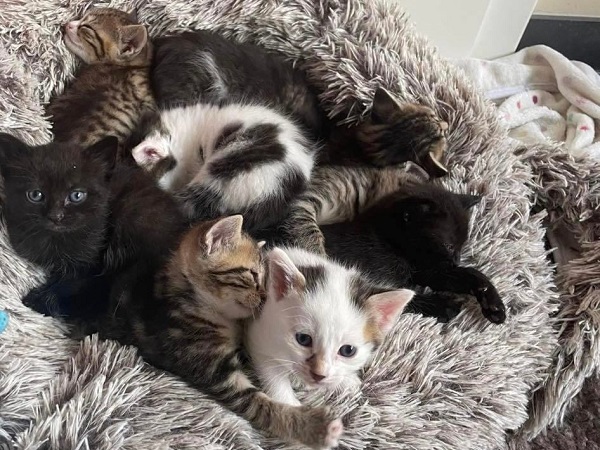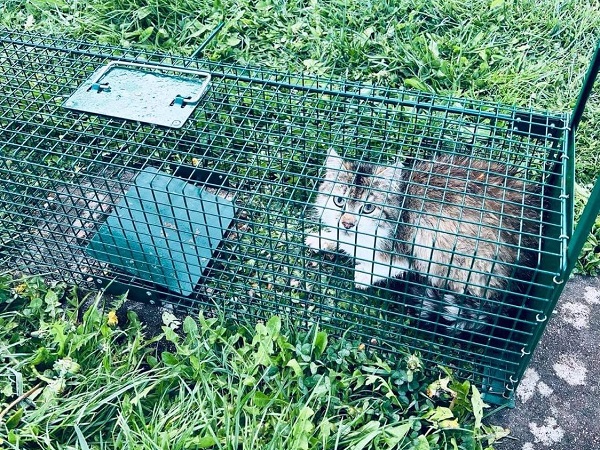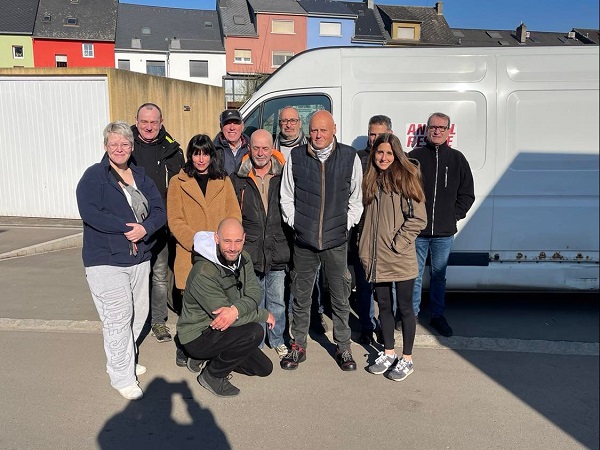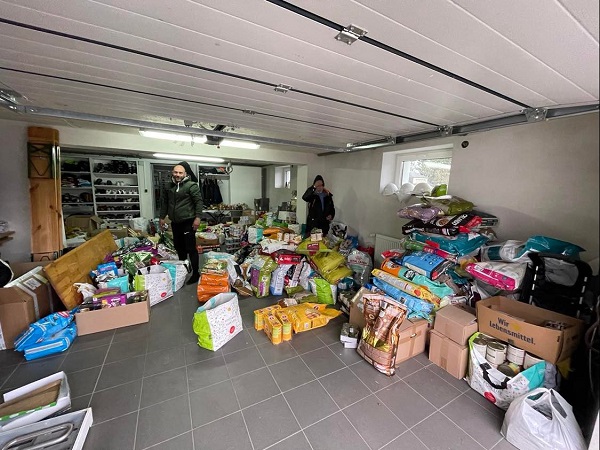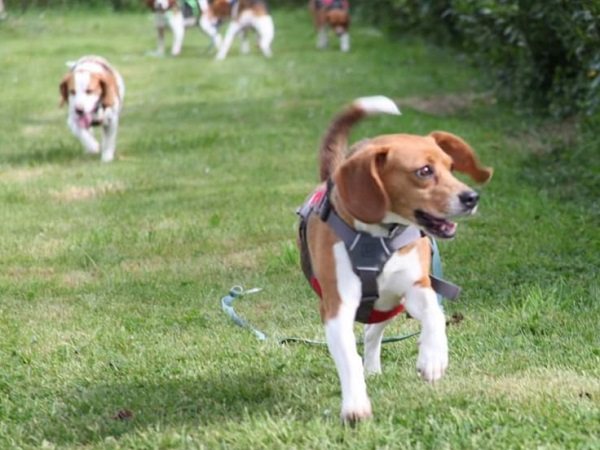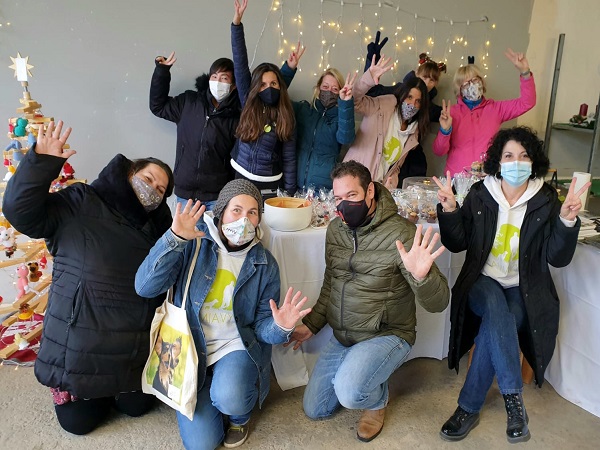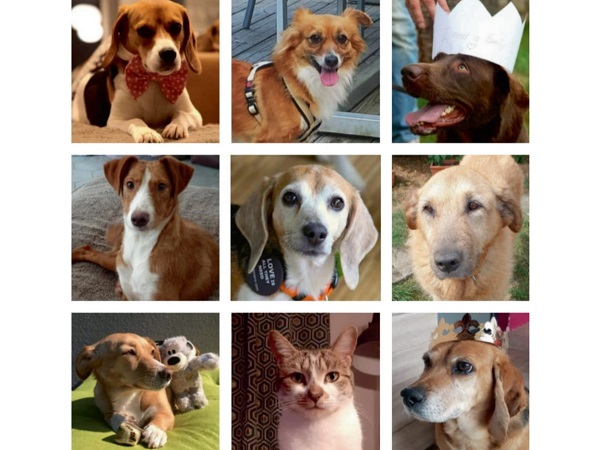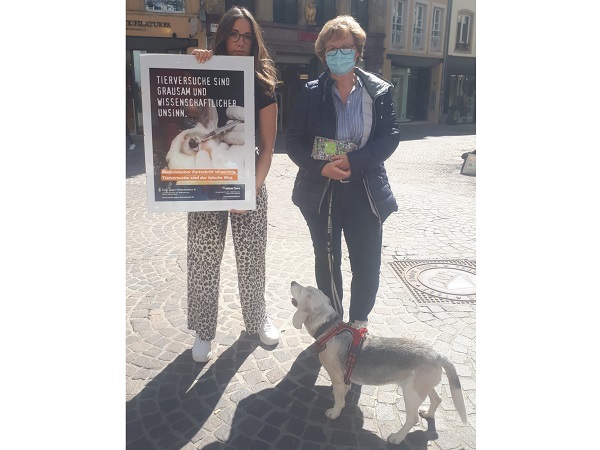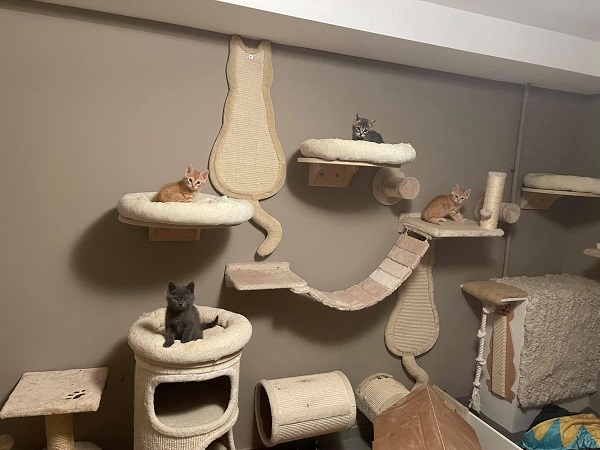 Credit: Mini-Miez Asbl
Credit: Mini-Miez Asbl
In the second part of this two-part article on the impact of the pandemic pet boom and the war in Ukraine on animal shelters and animal welfare organisations in Luxembourg, three local organisations shared their experiences with Chronicle.lu: Een Herz vir Streuner Asbl, Amiavy Asbl and Mini-Miez Asbl.
Like the four animal shelters presented in the first part of this article, these non-profit organisations agreed that the pandemic has had a significant impact on their work and stressed the need for volunteers and private donations to help them fulfil their respective missions.
Een Herz vir Streuner Asbl
Speaking to Chronicle.lu, Nadja Burg, President of local animal welfare organisation Een Herz vir Streuner (a heart for strays), noted that the COVID-19 pandemic has had “a big impact” on the non-profit’s operations because two years ago, “everybody adopted an animal” and now with the return of “normality”, many are no longer able or want to keep their pandemic pets. She lamented that the shelters are now full, particularly with cats since it is currently kitten season.
Founded over one year ago by Ms Burg and her long-time colleague in the field of animal welfare, Laurènce Schreiner (Vice President), Een Herz vir Streuner aims to help Luxembourg’s many stray cats, which are often not neutered and thus breed a lot, may fall victim to incest and find it difficult to survive. “Every year there are more and they will get ill. We want to help animals here on the streets in Luxembourg”, explained Nadja Burg.
The team’s most important work is going out and catching these cats in order to neuter and microchip them and do a veterinary check up on their health. Ms Burg recalled that neutering and microchipping [outdoor] cats has been the law in Luxembourg since 2018. In many cases, the cats, many of whom were born on the streets, are then released back into the wild, particularly those who prefer to stay away from people. For others, the team looks for their new forever home.
Last year, Een Herz vir Streuner caught, neutered and microchipped over 400 cats. The organisation also takes in a lot of abandoned kittens and pregnant cats, which then stay with one of four foster families. For kittens without a mother, the foster families bottle feed and take care of them, vaccinate and chip them, before looking for a new home for them. “Foster family is a really important thing and job. It’s really hard, because sometimes you have to wake up every two hours to bottle feed [and] take care of them”, Ms Burg noted.
The team usually follows up on calls from the public to find these stray cats. They then check if the cats have an owner and if not, they neuter and take care of them. Ms Burg added that a big issue in Luxembourg was farmers failing to neuter their cats. “So we go actively to the farmers and explain why it’s so important to neuter them. And then we help them to catch them”, she said.
Een Herz vir Streuner also takes care of animals who are found injured or in ill health, bringing them to the veterinarian and caring for them until they are better again. When people find dead animals, the team goes there to check their microchip and to find and reach out to their owners if they have one. They also take in animals when their owners no longer have time for them or cannot keep them. If they cannot take in the animals themselves, the team takes them to an animal shelter, such as APAS, with whom Een Herz vir Streuner works closest in Luxembourg. Last year, the organisation was also involved in three cases of animal hoarding in Luxembourg. In one case, they removed over 260 animals from one house.
In terms of supporting Ukraine, Een Herz vir Streuner has sent donations to the war-torn country twice so far. Together with APAS, the team organised their own trip to Ukraine, sending five lorries full of medication and food. They also brought a lot of animals back with them to the animal shelter in Schifflange “and a lot have already found a forever home”. Ms Burg added that the team also helps people arriving in Luxembourg from Ukraine with their animals, for example if they require pet food.
Beyond Luxembourg (and Ukraine), the organisation sometimes helps other animals abroad. “But most of our activity is in Luxembourg”, she said.
Nadja Burg emphasised that the organisation is composed exclusively of volunteers (herself and Laurènce Schreiner as well as two active members who help them daily and four foster families) and receives no government funding. As such, it relies on donations from the public to help with financial costs, for example veterinarian or food-related costs. The team also organises two or three markets per year, together with Amiavy Asbl, where they sell items to raise money for their animal welfare work. The next market is taking place at Centre Nicolas Braun in Hesperange (474 Route de Thionville, L-5886) on Sunday 19 June 2022, from 10:00 to 18:00.
She noted that they were looking for new families for their cats, adding that kittens are always given in pairs so that they are not alone and they have someone their own age with whom they can play. The organisation takes care of their vaccines, microchips and EU passports, among other things, and carries out a control before and after adoption as well as drawing up an adoption contract. Since the team spends so much time caring for these animals, “it’s important that they find a perfect home and we stay in contact with the people”. The contract also states that the new owners must neuter the cats. Ms Burg recalled that they have cats of all ages and also sick cats who are up for adoption, not just the much sought-after young cats. “It’s important that people understand that [an animal] is a responsibility for 20 years. It’s like a child”, she stated. “You have to be there when it is ill. It can cost money. But it’s a family member so you have to take care of it”. She recalled the importance (and legal obligation) of neutering and microchipping one’s cat, which can help reduce the issue of stray cats in Luxembourg. Indeed, she estimated that there are around 10,000 stray cats in the Grand Duchy. She also recalled that stray cats may also look healthy on the outside, even if they are ill on the inside.
Like many other shelters and organisations, volunteers are always needed at Een Herz vir Streuner. At present, they have enough foster families, but need more people to help trap the cats or help out at events such as the annual markets. Donations are also always welcome.
“For us, it’s really important to say we work really [closely] with a lot of other animal welfare associations here in Luxembourg”, she added. As well as working together with APAS, for instance on the Ukraine project, Een Herz vir Streuner works closely with Amiavy Asbl and sometimes with the Association Luxembourgeoise pour la Protection des Animaux Asbl (ALPA), among others.
Further information is available at: https://www.facebook.com/Een-Herz-vir-Streuner-103710868580031/about/?ref=page_internal
Bank details: Een Herz vir Streuner BCEE LU64 0019 5955 9608 5000
Diggicash: 691091007 Nadja Burg or 621 146 786 Laurènce Schreiner
PayPal: nb@effekt.lu
Amiavy Asbl
Amiavy Asbl was founded in 2009. As Vice President Adela Fuentes explained, the team’s initial work focussed on sending donations to animal shelters in Spain and bringing dogs back to Luxembourg for adoption. They soon decided that they could help animals more concretely by creating an Asbl in the Grand Duchy. Since 2011, Amiavy Asbl has pursued a mission based on four permanent pillars: helping shelters and animals abroad, rehabilitating laboratory dogs, raising awareness and helping dogs in need in Luxembourg as well as getting them adopted. Within this mission, the team helps find foster families for animals in need, collects donations and organises events aimed at supporting these animals.
Concerning the second pillar mentioned above, Amiavy Asbl President Lucie Pereira witnessed the situation of laboratory dogs (animal testing), often beagles, and wanted to help them. This became an integral part of the non-profit’s work in 2011 and continued until the start of the COVID-19 pandemic. Adela Fuentes noted how scared these dogs were when they saw the outside world for the first time. The team contacted Alfort National Veterinary School near Paris with whom they worked together to help laboratory dogs for eight years. In terms of rehoming these dogs, Amiavy Asbl often contacted people with prior experience with beagles. During the COVID-19 pandemic, the department with which Amiavy Asbl worked at the veterinary clinic closed and their contact person there switched jobs.
The non-profit also helps animals here in Luxembourg. People can contact them if they cannot keep their dog or cat but do not wish their animals to go directly to an animal shelter. Amiavy Asbl helps find a new family for these animals and when everything seems positive, they meet the potential pet owners and carry out a pre-adoption control. After a couple of weeks, if all is well, they draw up an adoption contract.
A strong opponent of animal testing, Amiavy Asbl visited the “Mausmobil” of Ärzte gegen Tierversuche (doctor against animal experiments) in 2016; this transportation van has the image of a mouse painted on it to convey the German voluntary association’s arguments against animal experiments and raise awareness among the public.
Two years ago, Amiavy Asbl decided to do something a bit different and began renting an orchard in Remich with the aim of raising awareness about animals and the environment among schoolchildren. Whilst this initiative is costly in terms of rent, the organisation deems it important in fulfilling its awareness-raising mission.
Regarding the work Amiavy Asbl carries out together with Een Herz vir Streuner, Ms Fuentes explained that they have been co-organising markets for two years and the teams get on well. “We are two organisations that really work with heart and soul to help animals”, she said.
Amiavy Asbl also sometimes supports SAPA Zenica, an animal welfare organisation in Bosnia and Herzegovina. For several years, it has offered more concrete help to a shelter in Portugal, spending €30,000 on food and bills and recently having invested €10,000 in wooden dog houses.
Concerning support for Ukraine, the non-profit has been working together with Déieren an Nout to bring pet food to the shelter / warehouse in Luxembourg-Kirchberg, as well as taking the pets of Ukrainian refugees to the vet when needed.
Adela Fuentes noted that the organisation always needs foster families, as well as volunteers with even just a small amount of time available to help out, whether they can help as “taxi” drivers or picking up donations or at the market once or twice a year.
Further details are available online: https://www.facebook.com/amiavy.asbl/about/?ref=page_internal
Bank details: Amiavy Asbl BCEE LU57 0019 3155 9088 4000
Mini-Miez Asbl
Claudine Simon, who is responsible for sponsorship at Mini-Miez Asbl, explained that the team is composed of a group of volunteers and cat lovers “who came together to help cats in need”. She noted that they mainly help kittens who have lost their mother, who are “abandoned or not wanted”, as well as pregnant cats who either do not have a home or whose owners are “overwhelmed” by the situation.
“All cats that are found or that people bring by are checked by a vet as soon as possible since they often have illnesses or parasites. The vet tests them for the most common diseases”, she continued.
“The cats we take care of get raised up under the best possible conditions. If the cats arrive at a weight of 800 grams, they get vaccinated for the first time and four weeks later, they get the second one. If all that is checked and clear, they leave us [in pairs] to find their forever family that has visited them a few times while they were at Minimiez”, she explained. “That’s the moment when our goal is reached and our work done. The moment when (at least) two happy healthy cats leave Minimiez to start their life with a new family”.
Ms Simon noted that the pandemic had had an impact on their work at Mini-Miez. “[W]e could not attend our usual markets where we sell creative goods like […] shopping bags we made ourselves, cat toys, food and drinks to collect the money we need for the vet, food and toys for the kittens and their mothers”. However, the team then “started to sew and sell self-made masks and sold [their] creations online, [which] helped a lot”.
Concerning the situation in Ukraine, she explained that the organisation has not been involved in any support initiatives, noting: “[W]e are a local association of volunteers; we act in our immediate environment”.
As for the need for more volunteers, she noted: “We can always use a hand or two to help, be it the creative part or to become a foster family for cats”.
Further information for those wishing to support the Luxembourg-based animal welfare organisations presented in this two-part article, for instance by volunteering their services or making a donation, is available on their respective websites / social media pages.
More information is available on the website: https://minimiez.lu/ and on social media: https://www.facebook.com/MinimiezKatzenbabiesAnNout
Bank details: IBAN LU37 1111 7014 7467 0000 BIC CCPLULL (also via Payconiq or PayPal)
Other animal protection organisations in Luxembourg: Association Luxembourgeoise pour la Protection des Animaux (https://www.facebook.com/Association-Luxembourgeoise-pour-la-Protection-des-Animaux-Asbl-ALPA-135970259838533/); Centre de soins pour la faune sauvage (https://www.naturemwelt.lu/nous-decouvrir/centre-de-soins/); Déierefrënn Lëtzebuerg (https://www.deierefrenn.lu); Déieren an Nout (https://www.deieren-an-nout.lu/); Déiereschutz Norden (http://deiereschutznorden.musicker.net/); Give Us A Voice Lëtzebuerg (http://www.giveusavoice.lu/); Privaten Déiereschutz (https://deiereschutz.org/); SOS Animaux (https://www.sos-animaux.lu/sos_animaux/Welcome.html)

